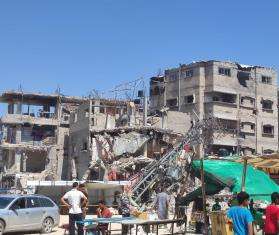MSF is opening a reconstructive surgery program to treat victims of violence, domestic burn accidents, and other injuries in Gaza.

Palestinian Territories 2009 © Isabelle Merny / MSF
An MSF surgeon at work in Gaza in 2009.
Though the embargo on the Gaza Strip has eased somewhat, it continues to affect the provision of health care. Certain medical needs are still not being met. Having assessed the situation and identified the needs, Doctors Without Borders/Médecins Sans Frontières (MSF) has decided to open, in collaboration with local health authorities, a reconstructive surgery program to treat victims of violence, domestic burn accidents, and other injuries.
It has been more than 18 months since the end of the Israeli military?s Operation Cast Lead in the Gaza Strip, and, despite the opening of crossing points and the arrival of aid sent by international NGOs, there are still chronic shortages of certain medical supplies and drugs.
Since the war, only one power station has been operational, but it cannot run at full capacity due to a lack of adequate fuel supplies. Power shortages are a daily occurrence. It often cannot be predicted when or if permits to allow the entry of more fuel will be granted, meaning that health facilities cannot count on being able to run their emergency generators and staff are forced at times to reduce the health care services they provide. This also affects the ability of health workers and patients to travel and the ability of ambulances to get where they need to go.
At home, people often have no choice but to use electric generators and low-quality, contraband bottled gas, both of which are sources of serious domestic accidents. Those injured receive treatment in MSF?s postoperative care program, which opened in 2007, or in Ministry of Health facilities. Some injuries require reconstructive surgery, but only two hospitals in Gaza?the Al Shifa and Nasser Hospitals?can provide such treatment, along with a few private clinics and surgeons. This creates delays. More than 500 patients are now slated to wait between 12 and 18 months for surgery they need. MSF has therefore decided to open a reconstructive surgery project to treat its patients and to reduce the Ministry of Health?s waiting list.
In May, an MSF team?consisting of a plastic surgeon, a general practitioner, and a logistics officer who specializes in biomedical equipment?led assessments at Nasser Hospital in order to set up this program and define the terms of our collaboration with the health authorities in Gaza.
MSF will send a surgeon, an anesthetist, and an operating theater nurse, all expatriates, to work with the hospital?s surgical team. The aim is to share skills in surgery, anesthesia, and postoperative care. Three days a week will be dedicated to surgery; the other two will be devoted to pre-operative examinations and medical monitoring.
Nasser Hospital already has most of the necessary equipment. Additional surgical equipment will be supplied by MSF. The MSF operating theater, sterilization room, and laundry room (where surgical materials are sterilized and washed) have been upgraded and the pharmacy supplied with specialized equipment.
The triage of 70 patients on the MSF waiting list and their pre-operative examinations are underway. The first surgeries were carried out at the beginning of August.



